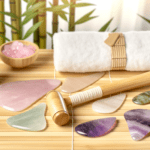The Quest for Personal Understanding
Embarking on the journey of self-discovery is a profound quest that many of us undertake in the midst of our lives. It’s a path that leads to greater self-awareness, personal growth, and a deeper understanding of our place in the world. Discovering who we are is not a destination but a continuous process that evolves with every experience and insight. Journaling serves as a powerful tool in this quest, providing a private space to explore our thoughts, feelings, and aspirations.
The Role of Journaling in Self-Exploration
Journaling is more than just a method of recording daily events; it’s a means of connecting with our innermost selves. Through the act of writing, we can uncover hidden emotions, reflect on our experiences, and clarify our desires. It’s a form of self-expression that can lead to unexpected revelations and a clearer sense of purpose. As we navigate through the complexities of midlife, journaling becomes an outlet to reflect on what we’ve learned and what we still yearn to understand about ourselves.
Overcoming the ‘No Time’ Barrier
One of the most common challenges faced by midlife women is the perception of having no time for personal pursuits like journaling. Life’s responsibilities often take precedence, leaving little room for self-reflection. However, making time for journaling is essential for self-discovery. It doesn’t require hours of commitment; even a few minutes each day can be transformative. The key is to recognize journaling as a valuable investment in oneself, not as a time-consuming task.
Journaling as a Habit, Not a Hobby
To truly reap the benefits of journaling, it’s important to approach it as a habit rather than a sporadic hobby. Consistency is crucial, and integrating journaling into your daily routine can help solidify this practice. Whether it’s first thing in the morning, during a lunch break, or before bed, find a time that works for you and commit to it. Journaling regularly not only enhances self-awareness but also provides a sense of stability and control during the unpredictable journey of midlife.
In the following sections, we will delve deeper into the psychological benefits of journaling, how to create a personal journaling practice, and provide 50 journal prompts specifically designed for the midlife woman’s journey to self-discovery.

If you wonder, if this discomfort and the dryness down there will be there forever….
Try Mae. Mae is gives you back comfort, control, re-assurance, and re-connecting.
Mae is more than just a vaginal moisturizer; it’s your ally for intimate natural health, rediscovering joy, cultivating comfort, and even igniting sparks of intimacy and rekindled romance. Mae is your companion in rejoicing in your femininity at every stage of life. Learn more…
The Psychological Benefits of Journaling
Emotional Well-being and Stress Relief
Journaling serves as a powerful tool for enhancing emotional well-being and providing stress relief. When thoughts and feelings are transferred onto paper, it creates a space for emotional release. This act of expression can lead to a sense of calm as it allows individuals to process and manage their emotions more effectively. By identifying and articulating stressors, journaling can also help in finding solutions and gaining perspective, making it easier to navigate through daily pressures and anxieties.
Enhancing Self-Awareness
One of the most profound benefits of journaling is the enhancement of self-awareness. As individuals write about their experiences, they begin to uncover patterns in their thoughts and behaviors. This introspection can lead to greater self-understanding and the discovery of personal triggers and habits. Over time, journaling can become a mirror reflecting one’s inner world, providing insights that might otherwise remain obscured.
Navigating Life’s Challenges
Life is replete with challenges, and journaling can be a steadfast companion through turbulent times. Writing about difficulties provides a way to structure and clarify the problems at hand. It can also serve as a rehearsal space for potential solutions, where different scenarios can be explored without real-world consequences. By documenting these challenges, individuals can track their growth and resilience, often finding that they are stronger and more capable than they initially believed.
Healing from the Past
Journaling can be a therapeutic process, aiding in the healing from past traumas and negative experiences. The act of writing allows for a safe exploration of memories and emotions. It can facilitate a process of understanding and forgiveness, both for oneself and others. As individuals write about their past, they can begin to let go of the hold that these experiences have on them, paving the way for healing and closure.
Goal Setting and Personal Growth
Setting goals is an integral part of personal development, and journaling can significantly enhance this process. Writing down goals helps to solidify them, making them more tangible and actionable. Journaling about aspirations and the steps needed to achieve them can increase motivation and accountability. Additionally, reflecting on progress and setbacks in a journal can provide valuable feedback, helping to refine strategies and maintain focus on the path to personal growth.
In conclusion, journaling is not just a method of recording life’s events; it is a pathway to a deeper understanding of the self. It offers a multitude of psychological benefits that can lead to a more mindful, resilient, and fulfilled life. Whether it’s through stress relief, enhanced self-awareness, navigating life’s challenges, healing from the past, or setting goals for the future, journaling can be a transformative practice for anyone willing to put pen to paper.
Do you know the three main ways that your body gets in touch with harmful chemicals with everyday products? Knowledge is Power!
The Ultimate Detox Guide will tell you how to lower your exposure to harmful chemicals!

Creating a Personal Journaling Practice
Choosing the Right Time and Place
Finding the perfect moment and setting for journaling is essential to making it a meaningful and sustainable practice. Consider when you feel most at ease and reflective—perhaps early in the morning with a cup of coffee, or late at night when the house is quiet. The location should be comfortable and free from distractions, a personal sanctuary where thoughts can flow uninterrupted. Whether it’s a cozy corner of your bedroom, a serene spot in your garden, or even a local park bench, the key is consistency and association; over time, this place will become a trigger for your writing habit.
Privacy and Honesty in Journaling
Journaling is a deeply personal activity, and privacy is paramount. It’s important to feel secure in the knowledge that your thoughts and feelings are for your eyes only, unless you choose to share them. This assurance of confidentiality encourages unfettered honesty in your writing, allowing you to confront truths and explore feelings without fear of judgment or repercussion. Consider using a journal with a lock or storing it in a private place to safeguard your privacy.
Developing Consistency
To reap the full benefits of journaling, make it a regular part of your routine. Consistency is more important than the length of each session; even just a few minutes each day can be powerful. Set a goal that feels manageable—whether it’s daily, every other day, or weekly—and stick to it. You might find it helpful to schedule a recurring reminder or to tie your journaling habit to another established routine, like after your morning meditation or right before bed.
Letting Go of Judgment
One of the biggest hurdles in journaling is the inner critic. It’s crucial to let go of self-judgment and allow yourself to write freely. Remember, your journal is not a literary masterpiece to be critiqued but a private space for self-expression and exploration. Embrace imperfections in your writing and view them as a reflection of your authentic self. By releasing the need for perfection, you open the door to deeper self-discovery and personal growth.
As you embark on this journey of journaling, remember that the practice is flexible and should serve your needs. It’s okay to adapt your routine as your life and preferences change. The most important aspect is that you’re carving out time for yourself, to reflect, grow, and discover the multifaceted layers of your being.
By the way, something for you, a little gift!!!
I am just in the middle of publishing my book. It’s about How women can balance their hormones. One part is about food and diet, of course.
Follow this link and enter your email.
I will send you this part of the book for free once the book is published. It has many concrete, practical tips and recipes and will help you feel better during menopause or times of Big hormonal fluctuations.
Annette, Damiva Lead for Health & Wellness

Journal Prompts for Self-Discovery
Understanding Self-Appreciation and Flaws
Embarking on a journey of self-discovery involves acknowledging and appreciating your strengths while also recognizing and accepting your flaws. Reflecting on these aspects can lead to a deeper understanding of oneself and foster personal growth. Consider these prompts:
- What are three qualities you love about yourself and why?
- Describe a flaw you’ve come to accept and how it has shaped your experiences.
- How do you balance self-improvement with self-acceptance?
- Reflect on a time when your flaw turned out to be an asset.
- Write about how you can show yourself compassion today.
Exploring Personal Desires and Happiness
Identifying what truly makes you happy is a cornerstone of self-discovery. Use these prompts to delve into your desires and what happiness means to you:
- What activity makes you lose track of time and why?
- Describe your perfect day. What elements can you incorporate into your daily life?
- What personal goal would bring you the most joy upon achievement?
- How do your desires align with your actions?
- Write about a time when you chose happiness over convenience.
Reflecting on Relationships and Emotions
Relationships and emotions play a significant role in our lives. Reflect on these aspects with the following prompts:
- Think of a relationship that has taught you a valuable lesson. What did you learn?
- How do you navigate your emotions in times of conflict?
- Write a letter to someone who has impacted your life positively.
- What does emotional fulfillment look like in your relationships?
- Describe an emotion you’re struggling with and explore its roots.
Contemplating Life’s Direction and Legacy
Considering the direction of your life and the legacy you wish to leave can provide clarity and purpose. Reflect on these ideas with the following prompts:
- Where do you see yourself in ten years, and what steps are you taking to get there?
- What do you want to be remembered for?
- How does your current path align with your values?
- Write about a change you’d like to make in your life and why.
- What legacy do you want to leave in your personal and professional life?
Addressing Regrets and Forgiveness
Dealing with regrets and practicing forgiveness are essential for moving forward. Use these prompts to explore these themes:
- Write about a regret and how you can learn from it.
- How do you practice self-forgiveness when you fall short of your own expectations?
- Describe a situation where you forgave someone and how it changed you.
- What steps can you take to release a past regret?
- Reflect on the power of forgiveness in your journey to self-discovery.
Through these journal prompts, you can embark on a reflective journey that not only celebrates your unique qualities but also embraces your imperfections. By exploring your desires, relationships, life direction, and approach to regrets and forgiveness, you can cultivate a deeper sense of self-awareness and purpose.

Bette 100% All-Natural Relaxing Lavender Body Lotion.
Chemical-Free
Your relaxing night time body moisturizer to leave the day’s stress behind. Decompress and wish your body good night with the calming scent of lavender.
Advanced Journaling Techniques
Stream of Consciousness Writing
Stream of consciousness writing is a powerful tool for self-discovery. It involves writing continuously without worrying about grammar, punctuation, or even making sense. This technique allows you to bypass the inner critic and tap into deeper thoughts and feelings. To practice, set a timer for 5-10 minutes and write whatever comes to mind. Don’t stop to edit or judge what you’re writing. You may be surprised at what emerges when you allow your thoughts to flow unfiltered onto the page.
Letter Writing as a Form of Reflection
Letter writing can be a cathartic experience, especially when it’s used for personal reflection. Write a letter to your past self, a future version of you, or even someone who has impacted your life. This form of journaling can help you articulate gratitude, forgiveness, or understanding. It’s a way to acknowledge growth and process emotions that may be difficult to confront directly. Remember, these letters don’t need to be sent; they are for your eyes only, unless you choose otherwise.
Using Prompts to Explore Different Facets of Life
Prompts are a great way to dive into journaling, especially when you’re unsure where to start. They can guide your writing towards different aspects of your life, such as career aspirations, personal relationships, or past experiences. Prompts can challenge you to think about situations from new angles and uncover insights about your desires and motivations. Use prompts like “What am I most proud of?” or “What lesson took me the longest to learn?” to explore the breadth of your life experiences.
Visual Journaling and Mind Mapping
Visual journaling and mind mapping are techniques that incorporate images, colors, and diagrams to represent thoughts and feelings. These methods can be particularly useful for those who think more visually or spatially. You can create a mind map to explore a particular situation or goal, using branches to represent different options or paths. Visual journaling can include sketches, collages, or even photographs that capture your mood or aspirations. These techniques can make abstract concepts more concrete and can be a refreshing break from written journaling.
By incorporating these advanced journaling techniques into your practice, you can deepen your self-exploration and gain clarity on your journey to self-discovery. Whether through the free-flowing nature of stream of consciousness writing, the intimate dialogue of letter writing, the guided exploration of prompts, or the creative expression of visual journaling and mind mapping, each method offers a unique pathway to understanding yourself better.
Overcoming Common Journaling Challenges
Dealing with Writer’s Block
Writer’s block can be a significant hurdle in maintaining a journaling practice. To overcome this, start by lowering your expectations. Remember, journaling is for your eyes only; it doesn’t need to be perfect. If you’re stuck, try prompt-based writing or simply jot down a list of things you’re grateful for. Sometimes, the act of writing anything at all can get the creative juices flowing.
Maintaining Motivation
Journaling is most effective when done consistently, but maintaining motivation can be challenging. To stay motivated, set realistic goals for your journaling practice, such as writing for five minutes each day. Also, keep your journal in a visible place as a reminder. Reflect on the benefits you’ve experienced from journaling, such as increased self-awareness or reduced stress, to reinforce your commitment.
Managing Distractions and Procrastination
Distractions and procrastination can derail your journaling practice. Combat these by scheduling a specific time for journaling, treating it as an important appointment with yourself. Create a distraction-free environment by turning off your phone and finding a quiet space. If procrastination is an issue, use a timer to create a sense of urgency and give yourself permission to write imperfectly.
Evolving Your Journaling as You Grow
As you evolve, so should your journaling practice. Periodically, take time to reflect on your journaling habits and adjust them to fit your current needs. Experiment with different styles, such as bullet journaling or stream of consciousness writing. Embrace new techniques like visual journaling or mind mapping to explore different aspects of your life. Remember, journaling is a personal journey that should adapt with you.
In conclusion, overcoming common journaling challenges involves a combination of practical strategies and a mindset that embraces growth and change. By addressing writer’s block, maintaining motivation, managing distractions, and evolving your practice, you can make journaling a rewarding and lifelong habit.
Conclusion: The Journey Continues
Embracing the Ongoing Process of Self-Discovery
As we reach the final pages of our shared exploration into journaling for self-discovery, it’s essential to recognize that the journey doesn’t end here. The path to understanding oneself is not a destination but a continuous voyage that evolves as we do. Embracing this ongoing process means accepting that self-discovery is a lifelong endeavor, one that requires patience, commitment, and curiosity. It’s about making peace with the fact that we are works in progress, and that’s not only okay—it’s beautiful.
Encouragement to Persist in Journaling
The habit of journaling, much like any other practice, can face ebbs and flows. There will be days when the words pour out like a river and others when the well seems to run dry. During these times, remember the psychological benefits you’ve cultivated through this practice: the stress relief, the enhanced self-awareness, and the clarity in navigating life’s challenges. Let these beacons of light guide you back to your journal, even if it’s just to write, “Today, I don’t feel like writing.” Persist, for the act of returning to your journal is an act of returning to yourself.
Invitation for Reader Reflection and Feedback
As we part ways on this written journey, I extend an invitation to you, the reader, to reflect on your own experiences with journaling. How has it shaped your midlife voyage? What discoveries have you unearthed about yourself? Your feedback is not only welcome but encouraged. Sharing your stories can inspire and empower other midlife women on their paths to self-discovery. So, I invite you to reach out, share your insights, and continue the conversation beyond the confines of these pages. Together, let’s celebrate the courage it takes to write our truths and the wisdom we gain in doing so.










